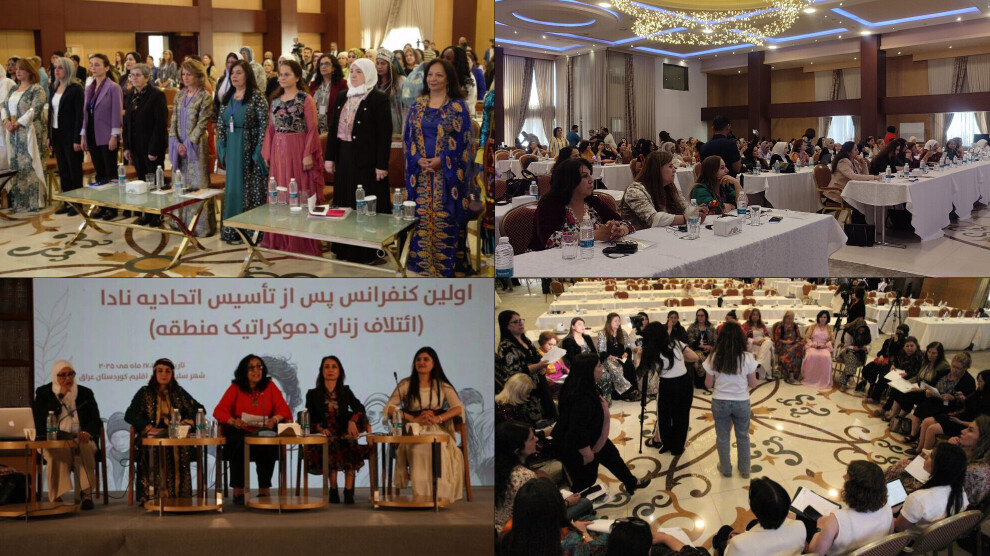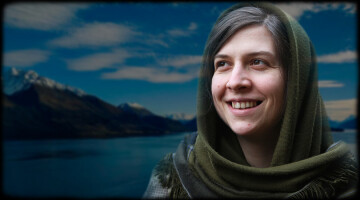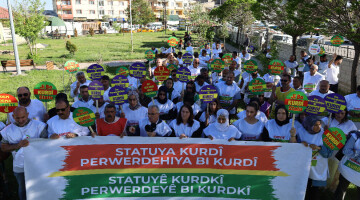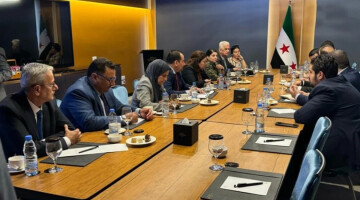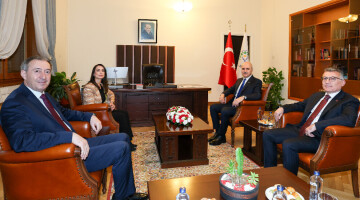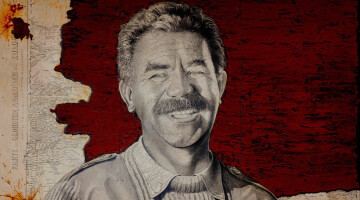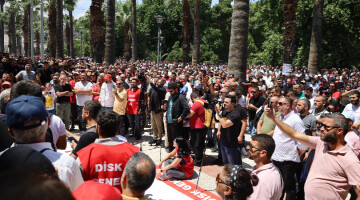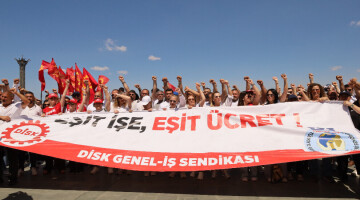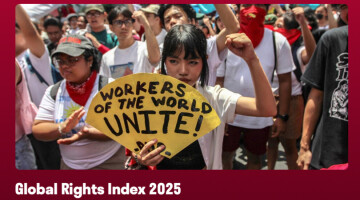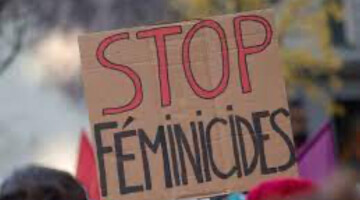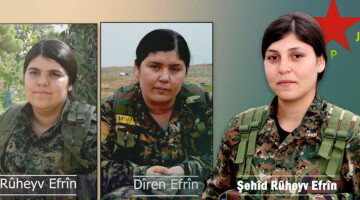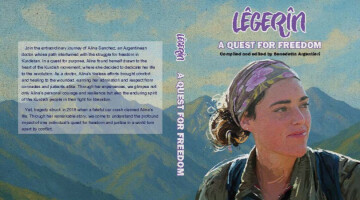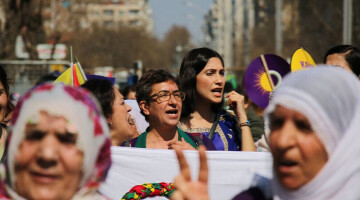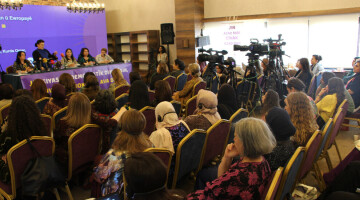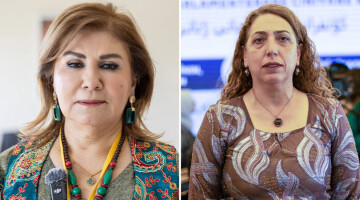The 1st congress of NADA, Regional Democratic Women’s Alliance in the Middle East and North Africa, took place in Sulaymaniyah on 15-16-17 May. About 200 women from 18 countries participated in the congress, sharing their experiences and organizing to strengthen the alliance for building a democratic society with women at the forefront.
Ruken Ahmed is a member of the Kongra Star Committee for Democratic Political Alliances. She is also part of the NADA Secretariat and helped organize the NADA Congress. The Congress was a significant event for women in the Middle East and North Africa and an important step in building democratic confederalism with women worldwide.
Below is an interview with Ruken Ahmed about the event, published by Kongra Star:
Preparing the NADA congress
“Before NADA, a conference for women in the Middle East was held in North Kurdistan. This helped pave the way for NADA. The second NADA conference took place in Başûr (South Kurdistan). In 2022, we held the founding conference in Lebanon. The Kurdish women’s movement was at the forefront, and the conference was attended by representatives from 16 countries, including Palestine, Libya, Tunisia, Morocco, Kurdistan, Iran, and Afghanistan.
At that time, we were not well organized. It was the first time we came together, and we lacked a clear plan or theoretical framework. We shared the situations in each country and set our goal to build an alliance. After the conference, committees were formed and country representatives were elected. Within three months, a charter was drafted based on the decisions made. This was the foundation that laid the groundwork for NADA.
One year ago, we decided to hold the second conference, but the wars in Palestine, Lebanon, and Syria made it difficult. We began preparing to hold the second conference in Jordan. We tried to organize it in Baghdad. However, it wasn’t possible in Jordan, Iraq, Egypt, Tunisia, or other places because of bureaucratic obstacles, visa refusals, and wars in many of these countries.
With the support of the ZHNAN – Women’s Union of Kurdistan – we held the congress in Sulaymaniyah (Başûr). In the months leading up to it, we began discussing and preparing the congress documents. This time, women from 18 countries participated in the congress activities, including Palestine, Lebanon, Jordan, Egypt, Tunisia, Morocco, Somalia, Sudan, Yemen, Mauritania, Iraq, the Kurdistan Region (KRI), Turkey, Iran, Syria, and Afghanistan. Around 200 delegates participated, not including guests and journalists. The presence of women from North Africa, Somalia, and Mauritania was a significant step forward.
The program of the congress
The three-day conference was held under the slogan, “With the women’s revolution towards a democratic society.”
The discussions were wide-ranging, vibrant, and profound. We didn’t just focus on individual countries. We examined the global system as a whole, including the current Third World War centered in the Middle East but involving the whole world, the ongoing war against women that remains unrecognized, and the role of nation-states in suppressing women. We also explored the links between laws, violence, and the system itself — specifically, how the capitalist system fuels the oppression of both women and nature.
The first day focused on these system-based problems. In response, we discussed the historical role of women in building peace, including how they have defended language and culture, created space for peace, and carried forward their histories. We emphasized the importance of documenting women’s history and used Jineolojî (Women’s Science) as an example of a framework for creating knowledge grounded in life. The first day focused on understanding the system and the role women must play in transforming it.
On the second day, NADA’s strategy was fleshed out. Four workshops were held in which participants discussed building women’s alliances, the challenges involved, and expanding these alliances on a larger scale. The role of civil movements in supporting women’s alliances within society was also explored. Through these workshops and committee discussions, a clearer strategy took shape.
In the afternoon, the focus shifted to the Rojava Revolution, also known as the North and East Syria Revolution, and its leading role in addressing women’s issues. Women’s world confederalism was also discussed. Later that day, participants addressed the ‘Call for Peace and Democratic Society’ by Abdullah Öcalan, considering how NADA could uphold and promote it. In a region torn by war, this message is relevant not only to the Kurdish and Turkish people, but also offers a solution for all conflict zones in the Middle East. With women at the forefront, NADA aims to carry this call forward.
On the third day, reports on NADA’s work were presented, including the challenges encountered, as well as criticism and self-criticism. The focus was on overcoming challenges. The statutes and methods of internal organization were reviewed alongside key foundational documents, including the one on world women’s confederalism. Three documents were approved: the Berlin document on women’s democratic confederalism; the report on the situation of women in North and East Syria; and the NADA statutes. These documents form the practical and theoretical foundation of NADA’s work.
The congress concluded with a final declaration. Moving forward, each country will hold elections to select their representatives to NADA. Seven committees were established to organize actions and ongoing tasks.
The impacts of this work
Why is this work important today? The Middle East and Africa are plagued by wars and genocides, and many countries are struggling under harsh conditions. Women are killed, kidnapped, and raped. Societies are destroyed. People live in camps. Economies collapse. Palestine, for example, has suffered physical and cultural genocide, with ongoing large-scale displacement. In Sudan, women are victims of mass rape, which is used as a weapon of war. They suffer violence even in front of their families, which leads to many suicides.
At the congress, it was shared that in Afghanistan, women are forced to cover their heads and faces due to Taliban pressure. They are still banned from education and face many restrictions. In Iran, women continue to suffer state violence and live under the constant threat of kidnapping and imprisonment. In Bakur, politicians are arrested, and in Rojava, women on the frontlines face danger. In Yemen, radical Islamist movements impose strict regulations on women. In Syria, Alawite women are subject to massacres. In Somalia, many women endure infibulation, or female genital mutilation. Due to conservative family traditions, change is resisted. Women from different regions and backgrounds spoke of their varied experiences.
Despite these differences, all of this suffering is connected — all violence against women stems from the same system and requires a united struggle. This should be a reason for women to unite, support one another, and stand in solidarity with each other. Women must strengthen their relationships locally, regionally, and globally to fight together.
Next steps
We cannot limit this to a small group of educated or politically active women. The results and gains of the women’s movement must reach every part of society. Women’s achievements must contribute to building a democratic and free society. Our slogan reflects this: “With women at the forefront, building a democratic society.” We must spread the struggle to transform society, challenge patriarchal thinking and behavior, and stop femicides. If we limit this to an elite few, it won’t bring about real change. All women must be able to defend themselves; otherwise, they will always be at risk of genocide.
In a world where nation-states under the capitalist system control vast numbers of weapons, it is absolutely necessary for women to organize their own self-defense. This is why women must unite their voices locally, regionally, and globally to express their dissatisfaction with the system and support each other, as outlined in the final declaration.
Key points of the declaration include NADA’s commitment to answering Öcalan’s call for “peace and a democratic society” and showing solidarity with women political prisoners and women in Yemen, Afghanistan, and Palestine. The decisions of NADA and the experience of Rojava as a practice of democratic confederalism in North and East Syria serve as a basis for building women’s alliances.
We are also considering how women from Africa and the Middle East can gain strength from this conference and take practical steps based on this experience.
The concept of world women’s democratic confederalism
The concept of women’s confederalism was first introduced by the people’s leader Abdullah Öcalan. The first conference on the topic was held in Frankfurt in 2018; the second was held in Berlin in 2021. NADA Secretariat participated in the second conference. Since then, we have based our work on the documents of democratic women’s confederalism and have aimed to advance its implementation in the Middle East and Africa. The first NADA conference lacked structure, but since that time, we have become much more organized. A secretariat will be elected for each country, and the number of participating countries has increased. On this basis, we adopted democratic women’s confederalism as our guidance. NADA operates according to this foundation in the Middle East and Africa. Additionally, we decided that the realization of women’s world confederalism is a core task for us.
By the end of the conference, the impact of democratic confederalism was deeply felt. The event included women from many different countries, cultures, and languages, not just Kurdish and Arab women. Simultaneous translations were available in Kurdish, Turkish, Farsi, Sorani, and Arabic, enabling everyone to engage fully with their cultural perspectives. Each evening featured cultural performances in which every nation showcased its art, language, and traditions. This cultural exchange, facilitated through art, music, and language, fostered an appreciation for the diverse cultures present on this continent. For instance, Palestinian and Somali women sang and danced in traditional attire, infusing the conference with new meaning and unity. Farsi speakers held seminars in Farsi, Turks in Turkish, and Kurds in Kurdish. No single language or culture dominated. This vibrant diversity highlighted the true colors and spirit of women’s movements. With this spirit, we can transform social systems with joy and enthusiasm, giving profound meaning to our collective efforts. This is vital because the so-called “Arab countries” are not homogeneous — there are many diverse peoples and identities within them. To dismantle the sexist and racist systems, we must recognize and honor this diversity. On the last day, we visited Halabja, a city in Başûr known for the 1988 Anfal massacre, where women from various ethnic groups expressed solidarity with the Kurdish struggle and honored the sacrifices made.
Nation-states tend to oversimplify people, such as labeling everyone “Arab,” even though many distinct cultures exist within these states. This is why the Abdullah Öcalan’s call for a new approach is so important for our continent. For instance, many people in Lebanon identify as Phoenician rather than Arab, and in Sudan, the government identifies as Arab, but the original inhabitants are Nubian. Similarly, the Arab identity has been imposed on the Kurds. The same has happened to indigenous peoples, such as the Amazigh in North Africa and the Nubians in Sudan. These peoples’ identities have been marginalized by state-enforced Arabization policies. In Morocco, Tunisia, and Libya, there are indigenous Amazigh peoples who resist being labeled solely as Arab. These peoples all struggle against nation-states that force an Arab identity on them. A democratic nation embraces everyone’s unique culture and language. This is why the patriarchal nation-state system, which is rooted in masculine ways of thinking, must be challenged. Women must be at the forefront of this new era because they are central to the resurgence and affirmation of indigenous peoples and their rights.”

